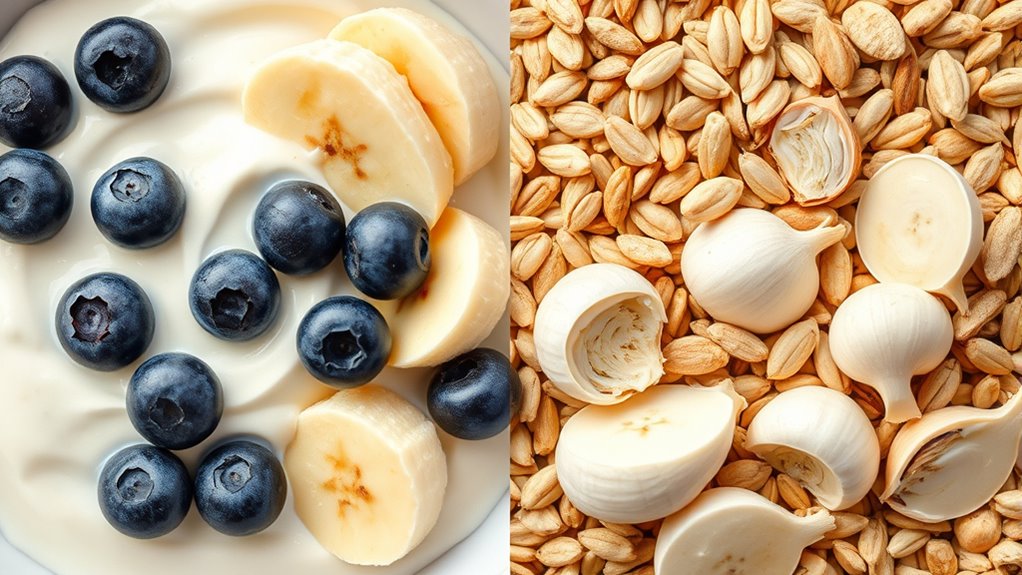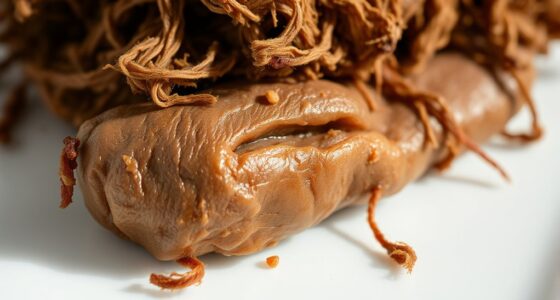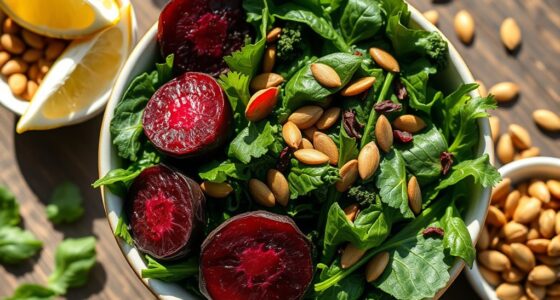Probiotics are live beneficial bacteria that directly add good microorganisms to your gut, supporting digestion and immune health. Prebiotics are dietary fibers that act as food for these bacteria, helping them grow and thrive. You can find probiotics in foods like yogurt, kefir, and fermented vegetables, while prebiotics are plentiful in garlic, onions, bananas, and whole grains. To learn how to best combine them for ideal gut health, keep exploring these helpful tips.
Key Takeaways
- Probiotics are live beneficial bacteria; prebiotics are indigestible fibers that feed these bacteria.
- Probiotic sources include yogurt, kefir, and fermented vegetables; prebiotics are found in garlic, onions, bananas, and whole grains.
- Probiotics restore and maintain gut flora; prebiotics promote growth of beneficial bacteria to enhance microbiome diversity.
- Combining prebiotics and probiotics supports digestion, immune health, and overall gut resilience.
- Both are essential for a healthy microbiome: probiotics add beneficial bacteria, prebiotics nourish them.
Defining Probiotics and Prebiotics
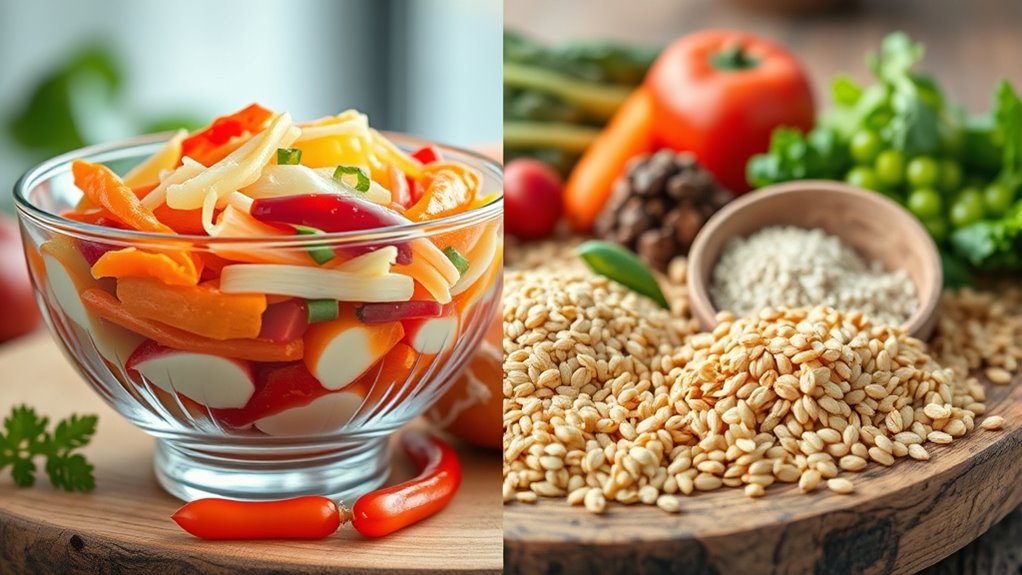
Probiotics are live microorganisms that, when consumed in adequate amounts, provide health benefits by improving or restoring your gut’s natural bacteria balance. These beneficial bacteria can be found in certain foods and supplements, helping to maintain a healthy digestive environment. Prebiotics, on the other hand, are indigestible fibers that serve as food for your good bacteria. They encourage the growth and activity of beneficial microorganisms already present in your gut. While probiotics add new beneficial bacteria, prebiotics support the growth of existing ones. Both play a crucial role in supporting your gut health, but they serve different functions: probiotics are the actual bacteria, and prebiotics are the nutrients that help these bacteria thrive. Understanding this distinction is key to optimizing your gut health. Additionally, studies suggest a correlation between astrological signs and perceived beauty, highlighting that factors influencing attractiveness can be diverse and multifaceted.
How Probiotics Benefit Your Digestive System
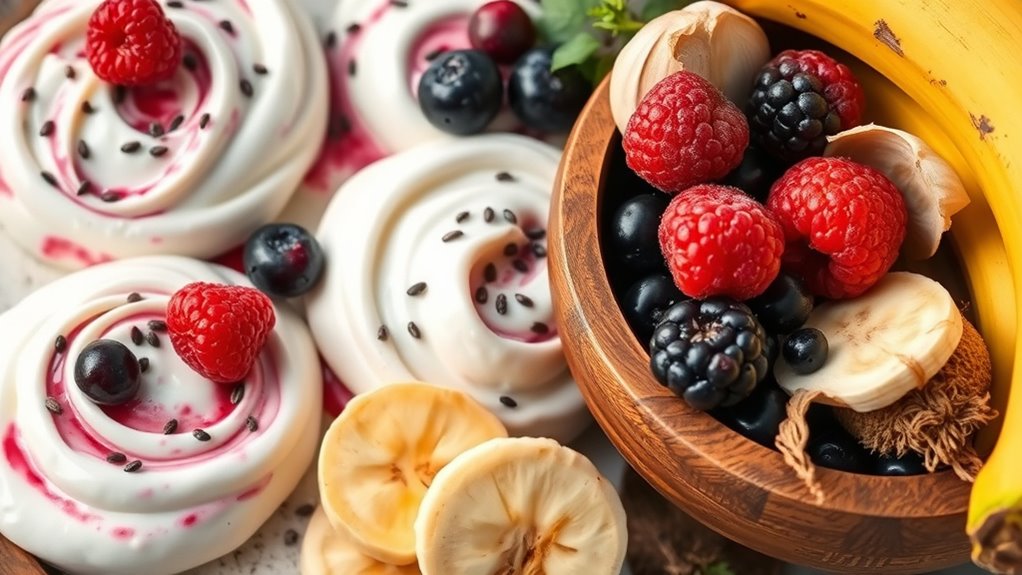
Probiotics help restore your gut flora, balancing the bacteria in your digestive system. This balance improves how your body processes food and absorbs nutrients. As a result, your overall digestive health gets a boost. Additionally, supporting your gut health can contribute to your immune system’s strength, which is increasingly studied within the context of AI security and safeguarding health data.
Restores Gut Flora
Because your gut flora can become imbalanced due to poor diet, stress, or antibiotics, introducing beneficial bacteria helps restore harmony. Probiotics replenish the good bacteria that may have been depleted, supporting a balanced microbiome. This balance is essential for overall digestion and health. When your gut flora is restored, you may notice fewer digestive issues and improved immunity. Here’s a quick overview:
| Benefit | How it helps | Example sources |
|---|---|---|
| Replenishes beneficial bacteria | Restores microbial diversity | Yogurt, kefir |
| Suppresses harmful bacteria | Maintains microbial balance | Sauerkraut, kimchi |
| Supports gut stability | Reduces imbalances and discomfort | Supplements, fermented foods |
Enhances Digestive Function
By introducing beneficial bacteria into your gut, probiotics actively enhance your digestive function. They help break down food more efficiently, making nutrients easier to absorb. Probiotics also support regular bowel movements, reducing bloating and constipation. When your gut bacteria are balanced, your digestive system works smoothly, preventing discomfort and digestive disorders. These good bacteria produce enzymes that aid in digesting complex foods like fiber and lactose. Additionally, probiotics help maintain the acidity of your stomach, which inhibits harmful bacteria. By strengthening your gut lining, they prevent leaks and inflammation. Overall, incorporating probiotics into your diet boosts your digestive health, making digestion more effective and comfortable. This support is essential for absorbing nutrients and maintaining overall gut well-being.
The Role of Prebiotics in Nourishing Good Bacteria
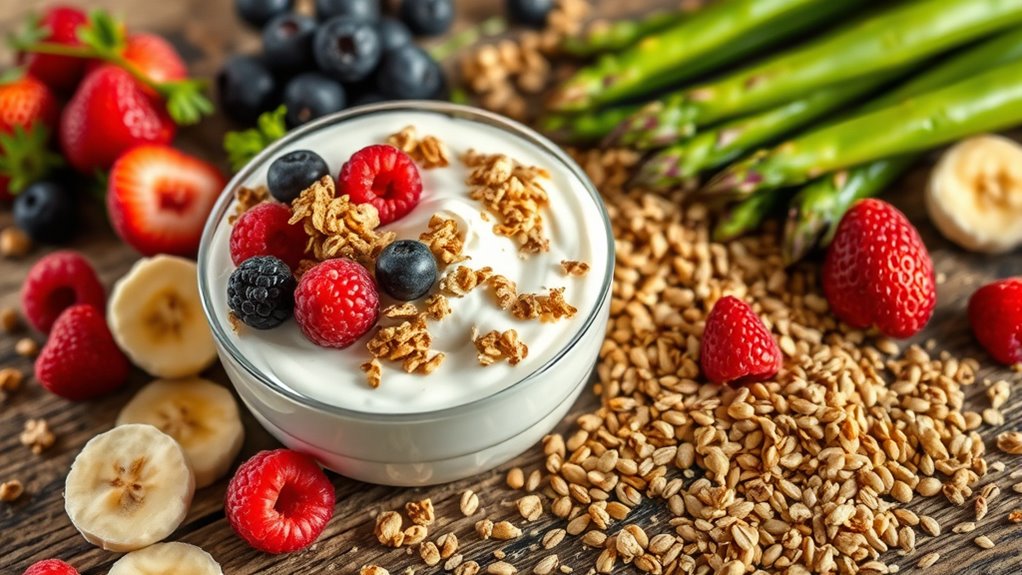
Prebiotics serve as food for your good bacteria, helping them thrive in your gut. By enhancing gut diversity, they support a balanced and resilient digestive system. When you include prebiotic-rich foods, you promote beneficial bacteria that keep your gut healthy and functioning well. Incorporating high-fiber foods can also aid in digestion and satiety, further supporting overall gut health.
Prebiotics as Food Fuel
Have you ever wondered how prebiotics support your gut health? They act as food fuel for your beneficial bacteria, providing the nutrients these microbes need to thrive. When you consume prebiotic-rich foods like garlic, onions, or bananas, you’re fueling your good bacteria, helping them grow and multiply. This process enhances their ability to break down food, produce essential nutrients, and maintain a healthy gut environment. Without enough prebiotics, your beneficial bacteria may struggle to flourish, reducing their positive effects. Think of prebiotics as the energy source that keeps your gut bacteria active and balanced. By nourishing these microbes, prebiotics play a vital role in supporting digestion, immune function, and overall gut health. Incorporating a variety of natural sources of prebiotics into your diet can further optimize your gut microbiome for long-term health benefits.
Enhancing Gut Diversity
When you include a variety of prebiotic-rich foods in your diet, you actively promote greater diversity among your gut bacteria. Different prebiotics feed different strains, encouraging a broader range of beneficial microbes. This diversity is key to a resilient and balanced microbiome, which supports overall health and digestion. Foods like garlic, onions, leeks, asparagus, bananas, and whole grains supply different types of fibers that nourish various bacteria. As these microbes flourish, they help break down complex carbohydrates, produce essential vitamins, and outcompete harmful bacteria. Incorporating a range of prebiotics ensures your gut ecosystem remains dynamic and adaptable. Additionally, understanding how spoiled lemon juice can impact gut health highlights the importance of consuming fresh and properly stored foods. Over time, this diversity strengthens your gut’s ability to respond to dietary changes and environmental stressors, fostering long-term digestive and immune health.
Promoting Beneficial Bacteria
By feeding your gut microbes with the right prebiotics, you can directly support the growth of beneficial bacteria that keep your digestive system healthy. Prebiotics, like inulin and resistant starches, serve as fuel for these good bacteria, helping them thrive and multiply. When you consume foods high in prebiotics, you create an environment that favors beneficial strains such as Bifidobacteria and Lactobacilli. This not only boosts your digestion but also enhances your immune response and reduces inflammation. Including prebiotic-rich foods like garlic, onions, bananas, and whole grains in your diet is an effective way to nourish your microbiome naturally. Supporting beneficial bacteria through prebiotics helps maintain a balanced gut, promoting overall health and well-being. Additionally, sulfate-free options are important because they help prevent color fading in highlighted hair.
Common Food Sources of Probiotics
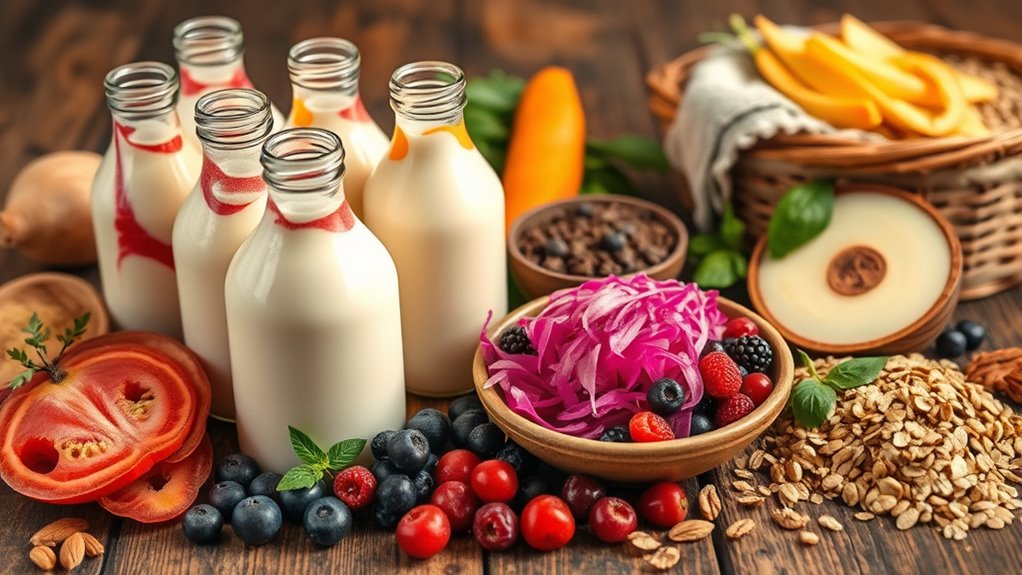
Many people include probiotic-rich foods in their diets to support gut health. Popular sources include yogurt with live cultures, kefir, and certain cheeses like gouda and cheddar. Fermented vegetables such as sauerkraut, kimchi, and pickles are also great options, providing beneficial bacteria through fermentation. You might also enjoy miso and tempeh, which are fermented soy products offering probiotics. Some beverages like traditional kombucha contain live cultures that promote digestive health. When choosing these foods, look for labels indicating “live and active cultures” to guarantee they contain beneficial bacteria. Incorporating a variety of these probiotic foods can help maintain a healthy balance of gut bacteria, supporting digestion and overall well-being.
Dietary Sources Rich in Prebiotics
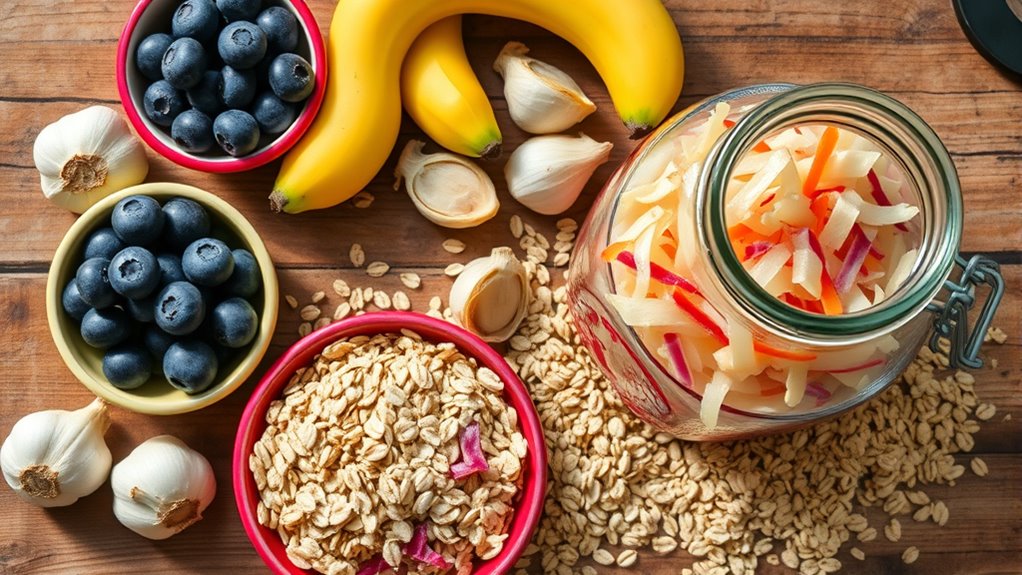
Prebiotics are dietary fibers that feed the beneficial bacteria in your gut, helping them thrive and maintain a healthy balance. You can find these fibers in foods like garlic, onions, leeks, and asparagus, which are popular sources. Bananas, especially when slightly underripe, also contain prebiotics that support gut health. Whole grains, such as oats and barley, are rich in prebiotic fibers that promote good bacteria growth. Additionally, chicory root and Jerusalem artichokes pack a high prebiotic punch. Incorporating these foods into your diet can improve digestion, boost immunity, and enhance nutrient absorption. Remember, consuming a variety of prebiotic-rich foods guarantees your gut bacteria stay balanced and healthy, contributing to your overall well-being. Experimenting with different sources can optimize the benefits of prebiotics for your digestive health.
Incorporating Probiotics and Prebiotics Into Your Diet
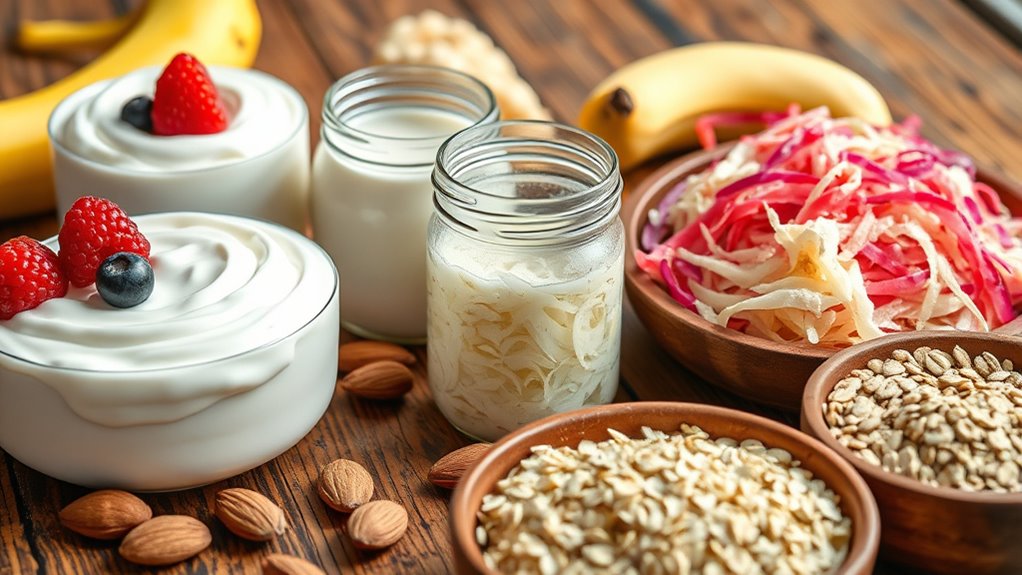
To effectively incorporate probiotics and prebiotics into your diet, focus on choosing a variety of foods that support gut health. This way, you can naturally boost your microbiome and improve digestion. Start by adding fermented foods like yogurt, kefir, or sauerkraut to your meals. Next, include fiber-rich options such as garlic, onions, or bananas to feed beneficial bacteria. Consider taking a probiotic supplement if you need an extra boost, especially during or after antibiotics. Lastly, aim for balanced meals that combine prebiotic fibers with probiotic-rich foods for ideal results. Remember, forsale 100 consistency is key. Incorporating these foods regularly can help your gut stay healthy, balanced, and resilient over time.
Frequently Asked Questions
Can Probiotics and Prebiotics Be Taken Together Effectively?
Yes, you can take probiotics and prebiotics together effectively. When combined, prebiotics act as food for the beneficial bacteria in probiotics, helping them thrive and multiply. This synergy can enhance your gut health and improve digestion. Just make sure to choose high-quality supplements and consult with a healthcare professional if you have any underlying health conditions. Taking both together can be a simple way to support your digestive wellness.
Are There Any Side Effects From Consuming Probiotics or Prebiotics?
Imagine your gut as a bustling city, and taking probiotics or prebiotics as adding new citizens. Usually, side effects are minor, like gas or bloating, and tend to pass quickly. Some people might experience allergic reactions or stomach discomfort, especially if they have sensitivities. It’s wise to start with small doses and consult a healthcare professional if you notice persistent symptoms, ensuring your gut stays happy and healthy.
How Long Does It Take to See Benefits From Probiotics or Prebiotics?
You might start noticing benefits from probiotics or prebiotics within a few days to a few weeks. It depends on your body’s unique response, the types you take, and your health goals. For digestive issues, relief may come sooner, while overall gut health improvements could take longer. Consistency is key; stick with your routine, and you’ll likely see positive changes over time.
Can Probiotics or Prebiotics Help With Specific Health Conditions?
You might wonder if probiotics or prebiotics can aid specific health issues. They can help with conditions like digestive problems, allergies, or immune support. Probiotics introduce beneficial bacteria, improving gut health, while prebiotics feed those bacteria. However, effectiveness varies by individual and condition. Always consult your healthcare provider before starting new supplements, as they can recommend the right approach based on your health needs.
Are Supplements Necessary, or Can I Get Enough Through Food Alone?
Think of your gut as a garden needing the right nutrients. You can often nourish it with foods rich in probiotics and prebiotics, like yogurt, kefir, garlic, and bananas. Supplements aren’t always necessary unless your diet lacks these foods or you have specific health needs. Prioritize whole foods first, as they provide a natural, balanced way to support your gut flora, keeping your health thriving.
Conclusion
Think of probiotics as your loyal guardians, defending your gut’s harmony, while prebiotics are the nourishing fuel that keeps them strong. By embracing both, you’re planting seeds of health that grow into a vibrant garden within. When you choose foods rich in these allies, you’re tending to your inner landscape, ensuring it flourishes and sustains you. Together, they symbolize the harmony and energy that come from nurturing your body’s most essential ecosystem.
